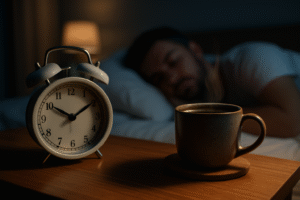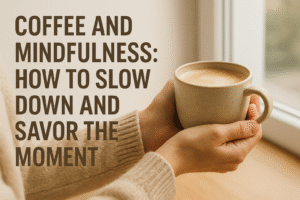For millions of people around the world, the day doesn’t really begin until that first cup of coffee is in hand.
Whether it’s brewed at home, picked up from a café, or sipped during the commute, coffee is deeply embedded in morning routines.
But beyond tradition and comfort, coffee also has measurable effects on your brain’s ability to focus, your mental alertness, and your overall productivity.
In this article, we’ll explore the science behind how coffee works in your body, how it boosts focus, how timing affects its impact, and how to make the most of your morning brew without the crash.
The Science of Coffee and the Brain
The key ingredient in coffee that drives mental performance is caffeine. Caffeine is a natural stimulant that primarily affects the central nervous system.
Its most significant action is to block adenosine receptors in the brain. Adenosine is a neurotransmitter that builds up throughout the day and causes drowsiness. When caffeine blocks it, you feel more awake and alert.
Caffeine also stimulates the release of neurotransmitters like dopamine and norepinephrine, which are involved in attention, motivation, and mood regulation.
This chemical shift leads to improved reaction time, concentration, and short-term memory—the key ingredients of productivity.
The Ideal Time to Drink Coffee for Focus
Many people reach for coffee immediately upon waking. While this can provide a quick boost, science suggests it’s better to wait 1 to 2 hours after waking.
That’s because your body naturally produces cortisol, a hormone that promotes alertness, in high amounts right after you get up. Drinking caffeine during peak cortisol production may reduce its effectiveness and increase tolerance over time.
The most productive window for coffee is typically between 9:30 AM and 11:30 AM, when cortisol levels begin to drop. Having your first cup during this window maximizes its focus-enhancing benefits and minimizes interference with your natural energy cycle.
How Coffee Improves Mental Focus
Coffee enhances mental focus in several ways:
- Increased alertness: Caffeine heightens your ability to detect stimuli and respond quickly.
- Improved sustained attention: You’re better able to concentrate on tasks for longer periods without becoming mentally fatigued.
- Better working memory: Caffeine helps with temporarily holding and manipulating information—essential for tasks like planning and decision-making.
- Greater task-switching efficiency: It becomes easier to shift focus between different assignments or types of thinking.
These effects make coffee especially useful for professionals, students, or anyone working on mentally demanding tasks.
Coffee and Creative Thinking
Beyond sharpening your focus for analytical tasks, coffee can also influence creative thinking. While caffeine is not a magic bullet for innovation, it can help you stay engaged and productive during long brainstorming sessions.
Caffeine supports the brain’s default mode network, a neural system associated with idea generation and associative thinking. When you’re alert but relaxed—a state that coffee can help facilitate—you may be more likely to make creative connections and solve complex problems.
However, overconsumption can backfire. Too much caffeine can increase anxiety, reduce lateral thinking, and narrow your mental flexibility. So, for creativity, moderation is key.
The Right Dose for Maximum Productivity
The ideal caffeine dose varies by individual, but most research suggests that 50–200 mg of caffeine (roughly one 8–12 oz cup of coffee) can enhance mental performance without significant side effects.
Higher doses—especially over 400 mg per day—may lead to jitteriness, anxiety, digestive discomfort, and disrupted sleep. That’s why it’s wise to track your intake and adjust based on how your body responds.
Also, consider your sensitivity to caffeine. Some people are fast metabolizers and can drink multiple cups without issue. Others are slow metabolizers who may feel overstimulated after just one small cup.
Coffee vs. Other Productivity Boosters
Compared to other common stimulants or productivity aids, coffee stands out for its natural composition, accessibility, and relatively low risk when consumed responsibly.
- Energy drinks often contain more sugar and synthetic additives, leading to quick crashes.
- Tea provides a gentler, longer-lasting caffeine effect but in smaller doses.
- Supplements like nootropics may offer enhanced cognitive effects, but they lack the long history of safe use that coffee has.
For most people, coffee provides the best balance of alertness, taste, ritual, and effectiveness.
Creating a Focus-Boosting Coffee Ritual
Turning your coffee habit into a ritual can enhance its productivity benefits. Rituals help prime your brain for focus, creating psychological cues that it’s time to work.
Here are tips for building a focus-friendly morning coffee ritual:
- Brew mindfully: Use the time to slow down, clear your head, and mentally prepare for the day.
- Pair coffee with planning: Review your schedule or write down your top priorities while sipping.
- Avoid multitasking: Use coffee time as a focused break or pre-work routine, not background noise.
- Create a sensory anchor: Associate the smell and taste of coffee with calm, focused energy.
These small steps turn a passive habit into an intentional practice that supports daily performance.
Avoiding the Crash: Smart Coffee Timing
Caffeine’s effects typically peak 30 to 60 minutes after consumption and last about 3 to 5 hours. However, its half-life—the time it takes for half the caffeine to leave your system—can be up to 6 hours or more.
To avoid an afternoon crash or trouble sleeping:
- Limit caffeine after 2 PM
- Hydrate throughout the day—coffee is slightly diuretic
- Pair coffee with food to reduce jitters or energy dips
- Take movement breaks to refresh your brain when the buzz wears off
Timing is just as important as the amount you drink. Thoughtful scheduling helps you stay sharp without the downside.
Can Coffee Replace Sleep?
No—and it shouldn’t. While coffee can temporarily offset drowsiness, it doesn’t reverse sleep deprivation. It masks the symptoms but doesn’t restore mental performance to full capacity.
Chronic reliance on caffeine to compensate for lack of sleep leads to:
- Reduced focus and memory over time
- Mood swings and irritability
- Dependency and increased tolerance
- Poorer sleep quality at night, creating a vicious cycle
Use coffee to enhance your energy—not to replace it. Getting quality sleep is the foundation of sustainable productivity.
Coffee and Task Types
Caffeine affects different types of tasks in different ways:
Repetitive tasks (e.g., data entry, monitoring)
- Coffee helps maintain attention and reduce boredom
Analytical tasks (e.g., writing, coding, problem-solving)
- Moderate caffeine improves focus, but too much may reduce accuracy
Creative tasks (e.g., design, brainstorming)
- Small doses can help, but overstimulation can limit idea generation
Adjust your caffeine intake based on what kind of work you’re doing, and when you need to be at your sharpest.
Final Thoughts: Let Coffee Work for You
Coffee is a powerful tool for improving focus, mental clarity, and daily performance—but like any tool, it works best when used wisely. Understanding how and when caffeine affects your body gives you the power to align your coffee habit with your goals.
Build a morning ritual, time your intake thoughtfully, and stay in tune with how coffee makes you feel. With a little planning, your daily brew can become a cornerstone of both wellness and productivity.

Marcio Luzardo is a coffee enthusiast and the voice behind Tudo Viraliza. With a passion for turning curiosity into practical knowledge, he shares easy-to-follow tips, guides, and insights to help readers enjoy better coffee every day. When he’s not writing, Marcio is exploring new brewing methods or diving into the rich stories that connect coffee to culture, lifestyle, and wellness.



